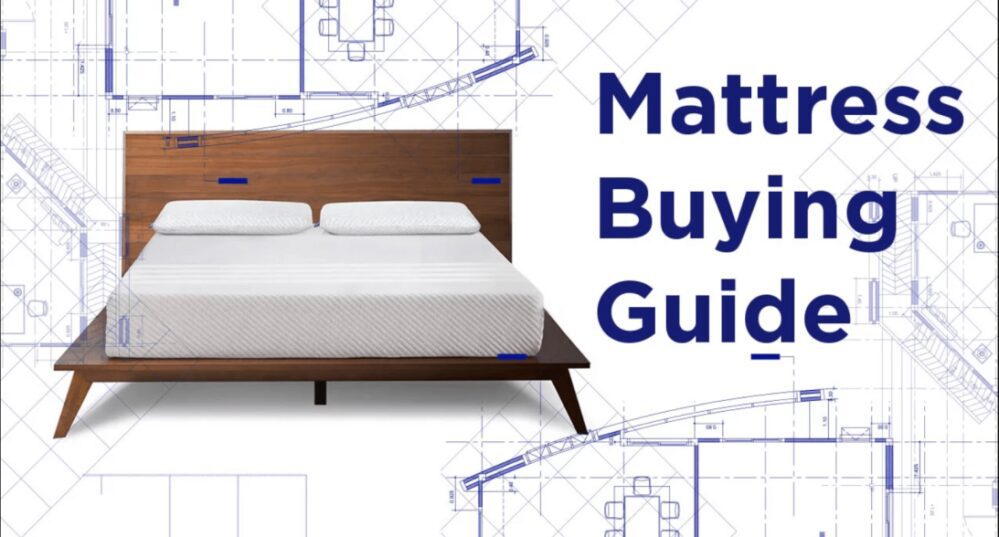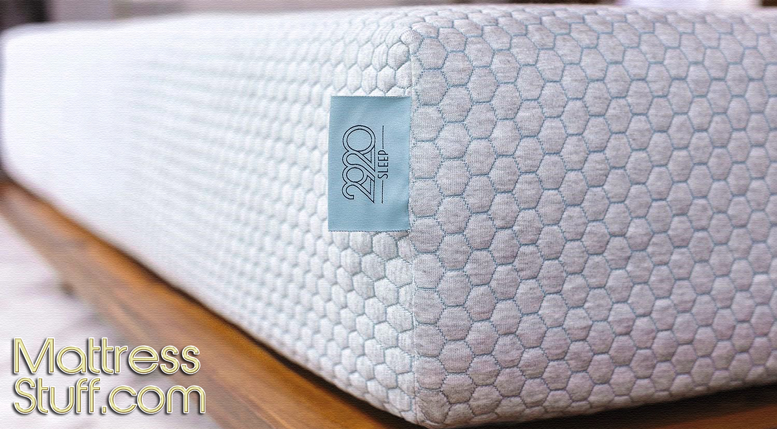
Table of Contents
Determine If You Need A New Mattress. One question with which we are always approached is, “How do I know if I need a new mattress?”
The answer is not always an easy one to answer. You can tell when you need a new car because your old one starts breaking down more often. You can tell that you need a new television if your old one won’t turn on. With your mattress, however, such visible, physical signs of needing a replacement are less obvious. In fact, your mattress may look as good as the day you bought it, but it is not the looks that count.
Mattress Buying Guide
Mattresses are designed to alleviate the pressure put on your back, shoulders, neck, and hips while you sleep. Your mattress should be replaced when it’s no longer providing adequate support for any of these critical areas of your body. In order to determine whether your mattress is in need of a replacement ask yourself these questions:
1. Is the mattress more than 7 years old?
2. Do you wake up with back, neck, shoulder, or hip pain?
3. Do you spend more than 10-15 minutes tossing and turning before you can get to sleep?
4. Do you frequently experience “dead” legs or arms when you wake up?
5. Is your mattress sagging, lumpy, starting to come apart or showing visible signs of wear?
6. Have you recently noticed that other beds (at a mattress store, hotel, friend/family member’s house) are more comfortable than your own?
While the life of a mattress depends on it’s material and how well it was manufactured, if you answered “yes” to Question 1, then chances that its time to start looking for a replacement. We should note that a manufacturer’s warranty does not necessarily guarantee that your mattress will continue to provide adequate support for the length of the warranty. Usually, a warranty simply means that a mattress manufacturer guarantee’s against defects in quality.
However, warranties do differ from one manufacturer to another, so be sure to read up on what the manufacturer of your current mattress has agreed to before purchasing a new mattress. If you answered “no” to Question 1, but “yes” to some of the other questions asked, then your bed may be new enough that it’s not worn out, but it sounds like it is not providing you with enough of or the right kind of support.
There may also be special cases that warrant the purchase of a new mattress, such as when floods or damp conditions cause your bed to develop harmful mildew or mold.
Once you’ve determined that you’d benefit from a new mattress, the next step involves making several key decisions that will help determine the mattress you’ll go shopping for.
Determine What Size Mattress Is Right For You. Deciding what size mattress you need may be fairly straightforward. If you’re simply replacing an existing mattress your decision is frequently limited by the size of the bed frame you’re using. If you’re looking to purchase a new mattress and frame here are some things you will want to consider:
1. How much space is there in the bedroom for a mattress?
2. How many people will be sleeping in the bed?
3. How satisfied were the people sleeping in the bed with the amount of space they had?
4. How much will it cost to upgrade to a larger bed, or how much will save by purchasing a smaller mattress (not only the cost of the mattress, but also the sheets and bedding)?
While mattress sizes can vary some, here are typical mattress sizes:
Mattress Name Dimensions (Width x Length)
- Twin 39″ x 75″
- Twin XL 39″ x 80″
- Full 54″ x 75″
- Full XL 54″ x 80″
- Queen 60″ x 80″
- King 76″ x 80″
- California King 72″ x 84″
Determine What Type Of Mattress You Need. Beds have come along way since the single coil mattress. Mattresses now include a variety of new technologies and are frequently hybrids of two or more types of material. When shopping for a new mattress there are a couple things to keep in mind.
First, you’ll want to buy the best value, not the least expensive. An inexpensive mattress may save you money up front but cost you a fortune in chiropractor costs in the future. Similarly, the most expensive bed on the market may not be providing you with the right kind or right amount of support and/or comfort.
Second, if you’re going to be sharing your bed with someone else, make sure you bring them with you when you go shopping.
The mattress you find most comfortable may not be the most comfortable for your partner. If that’s the case you’ll want to find a mattress you can both agree is suitable, even if it’s not your first choice.
To properly evaluate each possibility you should lay on the mattress the same way as you’ll be sleeping each night. Be sure to lay on the mattress for at least a few minutes. Some of the materials used in mattresses respond to both weight and heat and can take several minutes to fully adjust to your body.
If you move quickly from one bed to another you may be missing out on all a mattress has to offer. Finally be sure to learn as much about the advantages and disadvantages of each mattress material. To give you a starting point we will cover the most significant features of each material below.
Coil Mattresses:
Coil mattresses rely on steel coils that are tempered to give them additional strength and durability. The coils can be placed in a variety of different configurations to provide additional support to specific areas of the bed.
A new coil spring beds are firm and are best at providing support for those who sleep on their back. In addition to being one of the more inexpensive mattress options on the market, coil springs are also easy to maintain. Regularly flipping the mattress helps prevent sagging, and ensures that you will get the most life out of your purchase.
However, coil mattresses have a shorter lifespan than some of the other options out there. They can begin to sag within a year and wear out within 5 to 7 years. If those using the bed sleep on their sides, the mattress exerts greater pressure on the shoulders and hips causing spinal misalignment, which can lead to back and neck pain.
Visco Elastic/Memory Foam Mattresses:
Originally developed by NASA to make the pressure of space shuttle lift-offs more bearable, the foam has seen drastic reductions in price in recent years and is now a popular mattress material. The material gets its name from its ability to conform to the shape of an object and retain that shape for a period of time.
While visco-elastic beds are typically more expensive than their coil counterparts, the quality can vary widely and is one of the main contributors to its price. Good quality memory foam means a firm bed that will evenly distribute your weight regardless of how you sleep.
Some memory foams also respond to heat by becoming even softer. Memory foam has lifespans between 10 and 20 years depending on quality. For those who have never owned a visco-elastic foam bed before there is typically a period of getting used to the “weightless” feeling the bed induces.
New memory foam mattress owners may also notice a strong odor. While the odor does fade with time, it can continue to cause irritation, so be on the lookout for complaints from those sleeping on the bed. Also, memory foam by nature retains heat which some users find uncomfortable.
Waterbed Mattresses
Although waterbeds were first conceived in the late 1800s the modern bed that we’re familiar with was developed in 1968. Waterbeds were initially popular for their ability to be heated (which was popular in colder climates) and for their ability to relieve pressure from the spine as the water in the bed conformed to the shape of the person using it.
However, this same “free flow” design that relieves spinal pressure also results in waves being created each time weight is shifted on the bed. These waves can be distracting and can interrupt sleep. Waterbeds are difficult to move and are also prone to leaks, but last longer than most coil mattresses and are dust mite free.
Air Chamber Mattresses
Air mattresses come in a variety of designs and levels of quality. However, the driving principle of an air mattress is (as the name implies) that you inflate the mattress with an air pump to a level you find comfortable.
Whether you’re using a simple, single chamber mattress or a more advanced multi-chambered bed, you’re able to control how firm the bed is by how much air you pump into the bed. The air in air mattresses behaves much in the same way as the water in waterbeds.
The air in the mattress conforms to the shape of the body and helps to reduce the amount of pressure put on the spine. While air mattresses have a typical lifespan of 10+ years, there are more parts that can wear out and causes the mattress to lose its ability to provide adequate support and comfort.
Intelli-Gel Mattresses
Another recently developed technology that is being adapted to a number of products – everything from shoe insoles to backpack straps to hunting equipment to mattresses. Intelligel is different from other bedding materials because it works on a column buckling principle.
Most other mattresses provide support by pushing against those protruding areas of the body. Intelli-Gel is different. Columns of an elastic gel are placed next to each other across the mattress surface. The columns are designed to stand until a certain amount of weight is placed on them.
When the columns’ weight limit is reached the columns buckle and becomes soft, while columns around the area remain firm and supportive. The result ends up being a bedding surface that is firm, supportive and comfortable.
Also, because the Intelligel is broken into columns it doesn’t retain heat like memory foam. Intelligel is used as the main material in some mattresses and is combined with coils, memory foam, and air chambers in others.
A couple other things to consider when looking at the different mattress options that are available is the mattress’s warranty and whether the mattress comes with a foundation. As mentioned above, a mattress’s warranty does not guarantee its useful life, but it does protect against manufacturing defects.
Typical warranties run between 10 and 15 years and may last upwards of 20 years. Be sure to read what the warranty does and doesn’t cover as it may save you time, money and headaches in the future. The foundation of your bed is an important part of how well you sleep each night.
Chances are that if your mattress needs a replacement, your foundation does too. Some manufacturers will include a new foundation with the purchase of a mattress. If they don’t be sure to ask the manufacturer which foundation will work best with your mattress as foundations and mattresses are commonly paired to provide you with the best sleeping experience possible.
Dispose of your old mattress. If you’ve determined you need a new mattress because you are no longer receiving the support you need, then the last thing you should be doing is passing that discomfort on to someone else.
Rather than selling your mattress or passing it on to a family member or friend, check to see if the purchase of your new bed includes some sort of disposal for your old mattress. Frequently, the folks who deliver your new mattress will be able to take away your old bed.
If you’re embarrassed by the condition of an old, worn out mattress, you can use an old bed sheet as an inexpensive solution. Simply cover the old mattress with the old bed sheet, send it off and enjoy your new bed!
Determine what new accessories you’ll need for your new bed. To further improve the support you get while you sleep you may also want to consider a new pillow. Like mattresses, pillows are also made in a variety of materials.
Besides traditional feather and down, pillows now also incorporate combinations of latex rubber, memory foam, air chambers, Intelli-gel and more. Finding a pillow to compliment the comfort your new bed provides will help turn your night’s sleep from good to great. Also, depending on the size mattress you purchased you purchased you may need new bedding.
While a mattress’s size is fairly standard in terms of its length and width, there are a variety of mattress depths being used to incorporate some of the new materials we’ve discussed. Be sure to check the depth of your new bed to determine whether you’ll need deep pocket sheets or larger blankets.



